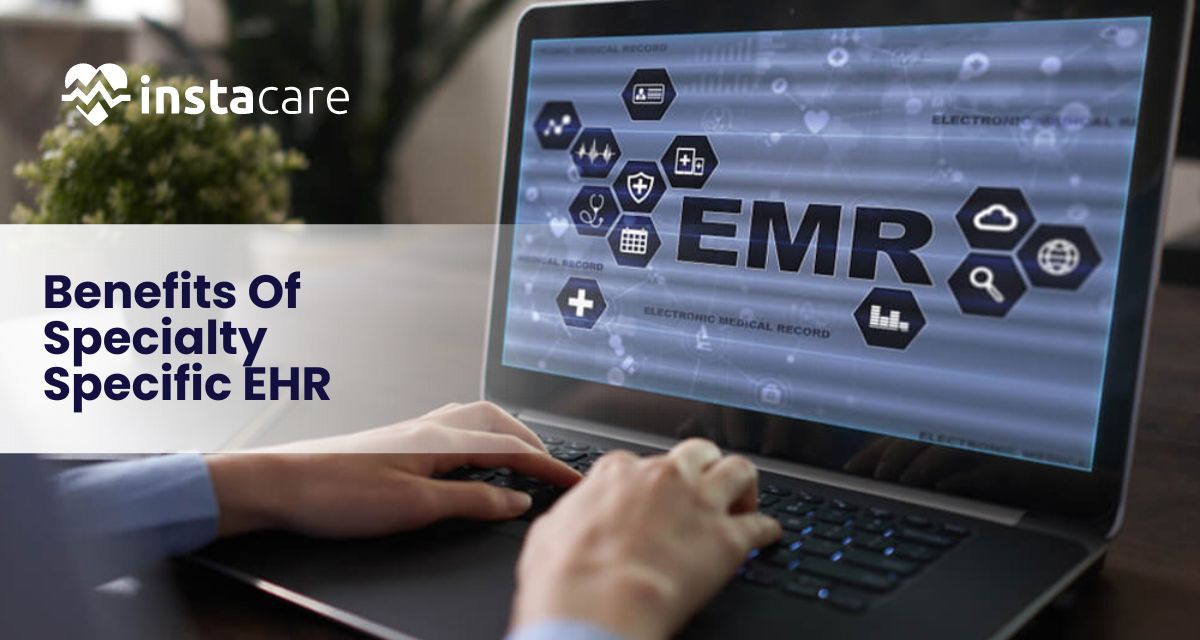Last updated on Tuesday, 3, September, 2024
Table of Contents
7 Benefits Of Specialty Specific EHR
In the field of health care, one of the major assumptions made is the use of Electronic Health Records” that has revolutionized patient record policies, data and information flow and general productivity. Nevertheless, all the EHR systems in use today are not the same in terms of functionality and construct. While general EHRs provide a variety of function, the specialty EHRs is developed to cover specific medical specialties’ requirements. These specific systems have also numerous advantages that may positively amplify the quality of care and functionality in specific practices. In this blog post, I am going to discuss about seven most important aspects that depict the advantages of using specialty specific EHR systems for healthcare specialty.
Here Are 7 Benefits Of Specialty Specific EHR
1- Tailored Workflows for Enhanced Efficiency
This brings the first major benefit of specialty specific EHRs based on the fact that it is implemented with specific workflows required in the practice of a given specialty. These are different from the generic EHR systems that need major changes in adapting to specialty practices, as the latter are developed as ready-made solutions with pre-set workflow, templates, and forms corresponding to the industry’s most frequent procedures and reports.
Such customization leads to smarter work processes with less emphasis on documentation and other bureaucratic functions wasting the time of health care providers. It appears easy to understand how it supports specialty work flow and lets providers take time for their clinical work without struggling with software processes.
2- Specialized Templates and Forms
Integrated specialty EHRs is designed with specialty specific templates and forms to support customized documentation for a certain specialty. For instance, an EHR system used in cardiology will have templates for echocardiography, stress test, and other cardiology related studies while an EHR used in dermatology will have templates that will take records of skin lesions, biopsies among other dermatological studies.
These templates are pre-built and relatively quick to utilize but as an added advantage they guarantee that all important information is captured thoroughly and in a standardized manner. The benefits of this idea are that the providers are able to record the patient visits, the procedures, and treatments offered within the simplest methods possible through using the provided templates that suits the specialty of the provider in question.
3- Improved Clinical Decision Support
Departmental EHRs may contain clinical decision support tools that are designed for use in a particular speciality. These tools give the healthcare provider best practice guidelines, vital alerts and tailored recommendations that are important to their field, and thus enhancing the ability of the provider to make right decisions during management of the patient. For example, an EHR developed for oncology practice contains specific decision support for chemotherapy dose while EHR for orthopedic practice may have specific decision support for the particular procedure, rehabilitation protocol and so on. This level of specialization improves on patient care outcomes through developing provider’s precise reach to pertinent knowledge.
4- Improved Patient Care and Optimized Patient Outcomes
Considering that EHRs are aimed only at a definite specialty, they allow providing more individualized and efficient treatment. This feature of the system is useful in making the providers to capture and monitor data related to the specialty so as to provide accurate patient outcomes and make necessary customization on the treatment plans.Furthermore, there are specialty specific EHRs and these contain patient education tools and resources that are relevant to the particular specialty; this way, providers are able to share more information with their patients, and get their patients more involved in the care process. Besides enhancing patient satisfaction, it has also been proven that this kind of approach has a positive impact on patient’s health condition.
5- Easy compatibility with Special Tools
Specialty specific EHRs can be designed in a way to provide interoperability with the medical instruments and equipments frequently used in the specialty. For instance, the EHR for ophthalmology may incorporate with digital imaging, for retinal scans, EHR for cardiology may include with such recording instruments as EKG machines and other Cardiac recording devices.
Through this integration can transfer the data from these medical devices as part of the patient’s EHR thus minimizing on manual input of data and therefore likelihood of errors. Recording and data storage from specialty-specific equipment in a centralized system also lead to higher accuracy and completion of patient records.
6- Compliance with Specialty Regulations
Healthcare fields in general and/or particular specialties can have country and/or specialty peculiarities that regulate healthcare. The specialty specific EHRs are developed keeping in consideration these regulations so that the system remains compliant to the regulations and standards of the specialty.
For instance, EHR for behavioral health may consist of procedures to fulfill the requirements on patients’ privacy and consent, whereas EHR for oncology may be developed based on the requirements set for cancer registries. This built-in compliance saves time to healthcare providers as well as practice from having to deal with many penalties due to non-compliance.
7- Scalability and Flexibility
These EHRs have been described as being customizable, which makes them ideal for a specialty practice as the practice expands and as the technology changes over time. As the practice matures the capabilities of the EHR system can be added to encompass not only additional features, modules to reflect the specialty but also include interfacing with other systems that the practice may employ.
This scalability means that EHR system will evolve in a way that is applicable for a large practice without having to constantly redesign the system or port to a new system that would be more expensive. Further, there are implementations of specialty specific EHRs today that have the principle of extensibility able to add further modularity to the system regarding the practices’ working models and private options.
Conclusion
Increased understanding of specialty specific EHR and its advantages make clear that the presence of this tool in specialised medical practices may bring many-sided improvement in the effectiveness, quality, and accuracy of patients care. From workflow to templates, from enhanced CDS to integration with specialty instruments EHRs being developed as specific to each medical specialty. The implementation of a specialty specific EHR therefore not only helps to organize a healthcare provider’s work and meet the legal requirements, but also improves patient care. Issues are still arising to make it more evident that the data capture for use in educating patient care will increasingly meld specialty need EHR toward offering enhanced stratified support to any specialized medical practice.
FAQs
What is the difference between a general EHR and a specialty specific EHR?
A general EHR is developed to address multiple specialties, and it exploits features that can be applied in multiple practices. Still, in may take more effort and time in order to be tailored to fit the requirements of a given specialty. Specialty specific EHR is on the other hand more generalized and is fully optimized to addressing the functional needs of a specific medical specialty because it is designed to contain specific templates, forms, and decision supports that suit the specialty.
What is the impact that a specialty specific EHR may have over a patient?
A specialty specific EHR improves the patient care because the tools and resources made available to the healthcare providers reflect his or her specialty. This entails customized templates for documentation, electronic tools based on a dataset and generators for writing notes based on evidence, intra-operative support devices, and interfaces with specialty biomedical devices.
Is it a difficult task to move from a non-specialty EHR to a specialty EHR?
A transition from one EHR system to another or from a conventional EHR to a specialty-focused EHR may not be cumbersome provided that the new system has been developed with the specialty’s requirements in mind. The transition may include small things like migrating data, training its staff and customizing the new system but with time the benefits are such as efficiency, tangible compliance, impact on patients among others.



